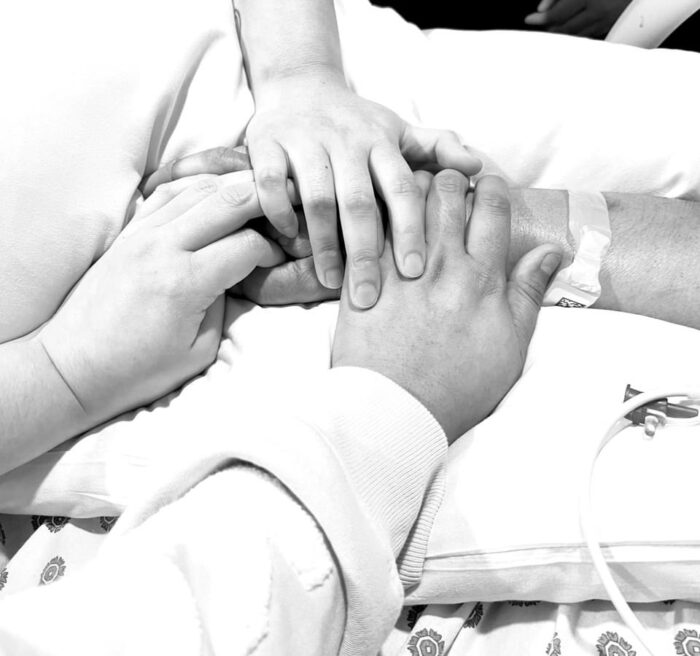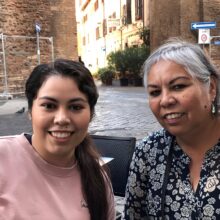By Ali Gutierrez
My name is Ali Gutierrez, and I’m a registered nurse, a PhD student, and the daughter of a woman who died from complications of dermatomyositis (DM) in 2022. Since my mother’s passing, I’ve dedicated my life to advocacy, research, and storytelling, not only to honor her memory but to change the way patients like her are treated, understood, and believed.
A Mother’s Strength
My mother, Lulu, was a single mom who raised three daughters after immigrating to the United States from Mexico. She didn’t speak English, but she worked tirelessly: cleaning homes, stocking shelves, making tortillas at a hot factory. She did everything she could to provide for us. My mother did not have family in the United States. She sacrificed and left everything she knew behind to provide her daughters with better opportunities. She was fiercely independent, full of warmth and grit, and never missed her morning cup of coffee. That cup symbolized calm and joy for her, no matter what life brought her way.
In early 2022, my mom began experiencing shoulder pain, fatigue, and a rash across her chest, back, and arms. Despite being a nurse myself, healthcare providers repeatedly brushed off my concerns. “Dermatomyositis doesn’t cause pain,” one rheumatologist said flatly, refusing to test her. She was given Tylenol. An ER physician even said, “I don’t mean to sound harsh, but unless she is dying, there is not much we can do for her.”
Meanwhile, she lost the ability to lift her arms. Then her legs became so weak she couldn’t walk. Then she couldn’t swallow. I brought her to multiple emergency rooms, multiple specialists, advocating fiercely at each one, but no one listened. Someone even said, “You are wrong. You don’t need a rheumatologist; you need a dermatologist. It’s in the name.”

Eventually, she was admitted and diagnosed by a neurologist, but by then it was too late. My mother was deeply depressed. She briefly entered remission before relapsing and was placed on a ventilator. She passed away on November 10, 2022, surrounded by her daughters, holding her hand. She was 62 years old.
A Mission Born from Loss
Losing my mother this way broke me open. But it also lit a fire. I knew I couldn’t let her story disappear into the background noise of a system that routinely fails people like her: immigrants, women, non-English speakers, those from underserved communities.
Since her passing, I’ve become a vocal advocate in the myositis space. I presented her story to the FDA at the 2024 Patient-Focused Drug Development (PFDD) meeting, and I volunteer with organizations like The Myositis Association (TMA). I’ve spoken out on diagnostic delays, clinical bias, and the dismissal of pain in myositis care.
“Look, Mom”: A Legacy We Still Speak Aloud
My mother never had the chance to travel growing up in Mexico. Before she got sick I made her a promise that when I became a nurse I would take her around the world. And I did, to Europe, New York, and places she never imagined seeing. On those trips, my sisters and I had a ritual: whenever we saw something beautiful—an ocean view, a mountain range, a sunset—we’d turn to her and say, “Look, Mom.”
Since her death, we still say it. When we travel and pause to see something breathtaking, we whisper it into the air: “Look, Mom.” It’s our way of bringing her with us, of keeping her spirit alive in our joy and discovery.
Research with a Purpose
I am currently pursuing my PhD in interdisciplinary health, and my dissertation will explore how depression affects quality of life for those who live with dermatomyositis. While I’m still in the early stages of coursework, every assignment, every paper, every project is shaped by this focus.
As a community and a potential collaborator, TMA’s support means everything to me. I hope to work with TMA on patient recruitment, data sharing, and broader awareness-building in the future. I believe research should be deeply human, grounded in lived experience, and aimed at tangible change.
A Voice That Continues
My mother’s story didn’t end in 2022. It lives on in every talk I give, every survey I build, and every patient I stand beside. She is the reason I do this work, and the reason I won’t stop.
If you are a healthcare provider and take anything from her story, let it be this: believe your patients. Listen to their pain. And remember that behind every missed diagnosis is a family holding their breath, waiting for someone to see them.
For my mom. For every mother. For every patient still searching for answers.
“Look, Mom. We’re still fighting.”


Thank you so much for sharing your story and continuing the fight. We need more committed people like yourself.
My sincere condolences on the loss of your mom. I know she is so proud of you and for what you are doing in her memory and for all of us suffering with this disease. Thank you for being our voice, thank you for your dedication and commitment to the medical field, and thank you for fighting our battle. I wish you all the best as you continue to pursue your PhD and research studies. May God bless you.
As a myositis patient I really know the feeling. This is a sad history because some doctors act from their own ignorance, some of them never wanted to be doctors but … In my opinion, always looks for best rated doctors that is the only guaranty that you will get the right diagnosis and treatment. Go always for 5 start doctors.